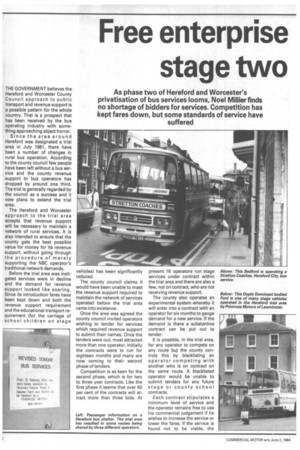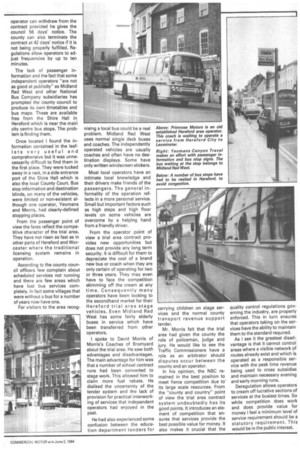Free enterprise stage two
Page 32

Page 33

If you've noticed an error in this article please click here to report it so we can fix it.
As phase two of Hereford and Worcester's privatisation of bus services looms, Noel Millier finds no shortage of bidders for services. Competition has kept fares down, but some standards of service have suffered
THE GOVERNMENT believes the Hereford and Worcester County Council approach to public transport and revenue support is a possible pattern for the whole country. That is a prospect that has been received by the bus operating industry with something approaching abject horror.
Since the area around Hereford was designated a trial area in July 1981, there have been a number of changes in rural bus operation. According to the county council few people have been left without a bus service and the county revenue support to bus operators has dropped by around one third. The trial is generally regarded by the council as a success and it now plans to extend the trial area.
The Hereford and Worcester approach to the trial area accepts that revenue support will be necessary to maintain a network of rural services. It is also intended to ensure that the county gets the best possible value for money for its revenue support, without going through the procedure of merely supporting the NBC operator's traditional network demands.
Before the trial area was instigated services were in decline and the demand for revenue support looked like soaring. Since its introduction fares have been kept down and both the revenue support requirement and the educational transport requirement (for the carriage of school children on stage vehicles) has been significantly reduced.
The county council claims it would have been unable to meet the revenue support required to maintain the network of services operated before the trial area came into existence.
Once the area was agreed the county council invited operators wishing to tender for services which required revenue support to submit their names. Once the tenders were out, most attracted more than one operator. Initially the contracts were to run for eighteen months and many are now coming to their second phase of tenders.
Competition is as keen for the second phase, which is for two to three year contracts. Like the first phase it seems that over 60 per cent of the contracts will attract more than three bids. At present 16 operators run stage services under contract within the trial area and there are also a few, not on contract, who are not receiving revenue support.
The county also operates an experimental system whereby it will enter into a contract with an operator for six months to gauge demand for a new service. If the demand is there a substantive contract can be put out to tender.
It is possible, in the trial area, for any operator to compete on any route but the county controls this by blacklisting an operator competing with another who is on contract on the same route. A blacklisted operator would be unable to submit tenders for any future stage or county school contracts.
Each contract stipulates a minimum level of service and the operator remains free to use his commercial judgement if he wishes to increase the service or lower the fares. If the service is found not to be viable, the operator can withdraw from the contract provided he gives the council 56 days' notice. The county can also terminate the contract at 42 days' notice if it is not being properly fulfilled. Regulations allow operators to adjust frequencies by up to ten minutes.
The lack of passenger information and the fact that some independent operators "are not as good at publicity" as Midland Red West and other National Bus Company subsidiaries has prompted the county council to produce its own timetables and bus maps. These are available free from the Shire Hall in, Hereford which is near the main city centre bus stops. The problem is finding them.
Once located I found the information contained in the leaflets very useful and comprehensive but it was unnecessarily difficult to find them in the first place. They were tucked away in a rack, in a side entrance port of the Shire Hall which is also the local County Court. Bus stop information and destination blinds, on many of the vehicles, were limited or non-existent although one operator, Yeomans and Morris, had clearly-defined stopping places.
From the passenger point of view the fares reflect the competitive character of the trial area. They have not risen as fast as in other parts of Hereford and Worcester where the traditional licensing system remains in operation.
According to the county council officers few complain about scheduled services not running and there are few areas which have lost bus services completely. In fact some villages that were vvithout a bus for a number of years now have one.
For visitors to the area recog
nising a local bus could be a real problem. Midland Red West uses normal single deck buses and coaches. The independently operated vehicles are usually coaches and often have no destination displays. Some have only written windscreen stickers.
Most local operators have an intimate local knowledge and their drivers make friends of the passengers. The general informality of the operation reflects in a more personal service. Small but important factors such as high steps and high floor levels on some vehicles are overcome by a helping hand from a friendly driver.
From the operator point of view a trial area contract provides new opportunities but does not provide any long term security. It is difficult for them to depreciate the cost of a brand new bus or coach when they are only certain of operating for two or three years. They may even have to face the competition skimming off the cream at any time. Consequently many operators have been looking to the secondhand market for their Hereford trial area stage vehicles. Even Midland Red West has some fairly elderly buses in service which have been transferred from other operators.
I spoke to David Morris of Morris's Coaches of Bromyard about the trial area. He saw both advantages and disadvantages. The main advantage for him was that a number of school contract runs had been converted to stage work. This allowed him to claim more fuel rebate. He disliked the uncertainty of the tender system and the lack of provision for practical interworking of services that independent operators had enjoyed in the past.
He had also experienced some confusion between the education department tenders for carrying children on stage services and the normal county transport revenue support tender.
Mr. Morris felt that the trial area had given the county the role of policeman, judge and jury. He would like to see the Traffic Commissioners have a role as an arbitrator should disputes occur between the county and an operator.
In his opinion, the NBC remained in the best position to meet fierce competition due to its large scale resources. From the "county and country" point of view the trial area contract system undoubtedly has its good points. It introduces an element of competition that ensures that services provide the best possible value for money. It also makes it crucial that the quality control regulations gov erning the industry, are properly enforced. This in turn ensures that operators taking on the services have the ability to maintain them to the standard required.
As I see it the greatest disadvantage is that it cannot control areas where a visible network of routes already exist and which is operated as a responsible service with the peak time revenue being used to cross subsidise and maintain necessary evening and early morning runs.
Deregulation allows operators to cream off lucrative sections of services at the busiest times. So while competition does work and does provide value for money I feel a minimum level of service requirement should be a statutory requirement. This would be in the public interest.
























































































